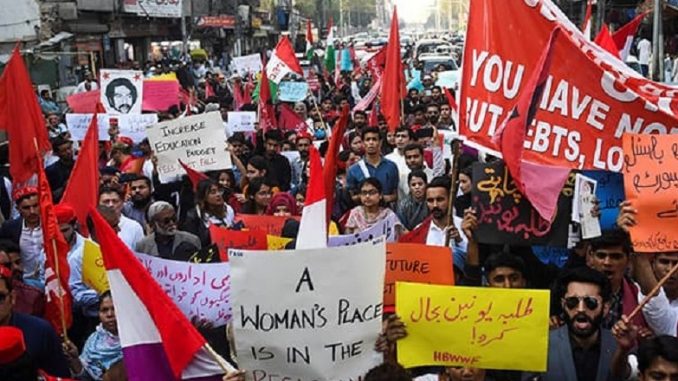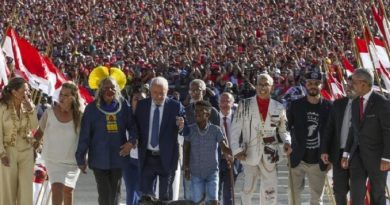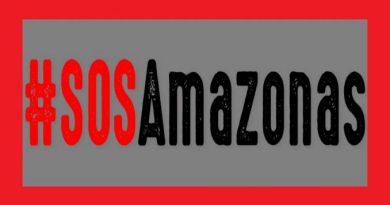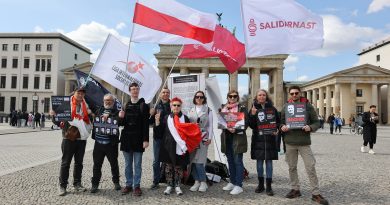Pakistan: student march 2020
ByAwais Qarni
This year the activities around the “March for the Restoration of Student Centers” are planned for Friday 27 of November. He 23 of November, The federal Minister of Education announced the closure of educational institutions for a month due to the increase in Covid-19 cases. The recent activities around the Restoration of the Student Centers are actually the continuity of the student marches of the last two years. Nevertheless, This year's activities have some important characteristics. Last year's march shook the sectors of power. These marches, which were carried out in more than 55 cities across the country, They had only one requirement: lift the ban 36 years about Student Centers. Students demonstrated their immense power in the streets, forcing government officials to at least verbally accept their constitutional demands for the centers. Bills were presented and debated in several provincial assemblies on the reestablishment of student centers. Nevertheless, through traditional political intrigues, The government muddled the entire discussion on the restoration of the centers with the “Code of Conduct”. Then, the entire discussion about student centers was hidden behind the façade of Covid-19, while in the same period new draconian measures were adopted against students. The HEC budget (Higher Education Commission) was reduced by half. Despite the lack of technical infrastructure and internet in most of the country, online education started. Regardless of the suspension of classes, not only fees were collected by force, but also increased exponentially. Horrific incidents of sexual harassment also increased. Scholarships for students from remote and backward areas of the country were abolished. This series of oppressive measures still continues, but the fight against these oppressions has also expanded. Students have waged a bold battle against online classes, since the poor technical infrastructure and the lack of broad internet accessibility make it impossible for them to take advantage of these classes. In the same way, from Balochistan to Peshawar to Gilgit they fought against harassment on university campuses. Students from Balochistan and ex-Fata held a successful long march against the abolition of reservation seats and scholarships. Medical students are also showing their strength against oppressive new administrative orders. The response of the students against all types of oppression is a reflection of the social unrest that until now was not expressed openly. Such circumstances give an extraordinary aura to the march for the restoration of this year's student centers..
Last year, A great success for the student movement was the establishment of the "Student Action Committee". Many of these committees multiplied in numerous cities throughout the country.. These steps had historical importance since their roots go back to the wonderful student-worker movement of 1968. This story of sacrifice and astonishing struggle stretches from the fight against the dictatorship of Ayub Khan to the fight against the reactionary dictatorship of Zia. The ruling classes were so terrified of the student organizations and their various progressive alliances that the dictator Zia Ul Haq cowardly imposed a complete ban on student centers in 1984. Nevertheless, Subsequent 'democratic' governments not only maintained the ban, but they also initiated criminal steps that further depoliticized the students and pushed them towards reactionary elements.. In 2007, despite the ban on student centers, the Student Action Committee waged a formidable fight against the Musharraf dictatorship. It is an irony of fate that at that time Student Action Committee meetings used to be held at Imran Khan's Lahore residence (the current prime minister). In Pakistan, all the rulers, when they are in opposition, They exploit the power of students for their petty interests and, when they come to power, they subject those same students to severe repression.
The legacy of Student Action Committees is not limited to one era, region or specific country. It encompasses all the struggles of young people and students against oppression and exploitation throughout the world and, especially, the sacrifice and selfless struggles of students in Pakistan for almost five decades. Despite all the regressive objective and cultural challenges, the formation of the current Student Action Committee is a big step forward. Historically, The Indian subcontinent has been the confluence of several cultures, some of which were the cradle of human civilization. As a result, the formation of democratic structures plays an important role in any movement. On the one hand, It has been shown that the formation of Student Action Committees in several cities is timely; on the other hand, has demonstrated its potential to successfully organize the activities of the 27 of November. They will also play an important role in future struggles.
The Covid pandemic represents a great challenge this year. While the fight requires sacrifices and selflessness, Battle planning and preferences guarantee success. In this sense, we have to analyze objective conditions meticulously and farsightedly to develop coherent analysis and perspectives. During the meeting in which the decision was made on the progress of the 27 November these points were raised. The Student Revolutionary Front (RSF) proposed to the Student Action Committee that we have to organize our activities taking into account the Corona pandemic and Covid-related quarantines. But several representatives of the Committee had other considerations. RSF, that adheres to democratic traditions, He avoided imposing his will on others and allows them to learn from his experience. Now is the time to learn lessons. We can compensate for our mistakes and avoid them by politically foreseeing, on the contrary, those who repeat their mistakes always get lost in the desert.
In view of the closure of educational institutions for a month, the students, especially women, They will have to confine themselves to their homes. Hostels will be closed. Economic hardship has increased so much that the basic necessities of life are beyond the reach of ordinary people.. Consequently, students will have to return to their homes. In this sense, the immediate order for the 27 November should be the abolition of online classes without internet and without basic technical infrastructure. Students may take to the streets in the future against such measures. These comparatively limited activities must be used as preparatory ground for future struggles. Until the normalization of the educational process, the political training of students is of utmost importance. Definitely, Last year's Student Solidarity March ignited the discussion around Student Centers; Nevertheless, There is still a long way to go and broader layers of students still do not know the importance of student centers. Even many cannot differentiate between student centers and student organizations. We need to write about these topics and spread them. Social networks can be a good platform for this purpose.. This time should be used to hold seminars and study circles for the training of young cadres.. In this way, collective youth leadership can be developed. Despite all the impressive qualities, Individuals cannot replace collective leadership. Only collective leadership can further strengthen the personal qualities of individuals.. This political education will create unprecedented confidence in students who will face all types of oppression. In this way, when the objective situation returns to relatively normal, Mass meetings may be held in the main metropolises throughout the country on the restoration of Student Centers. This will generate a crop of politically aware students who will have a deep understanding of the Student Centers' past., of its historical role and its potential in the current era. These students will not be seduced by the empty promises of the rulers, but they will tear away their rights with their collective power.




